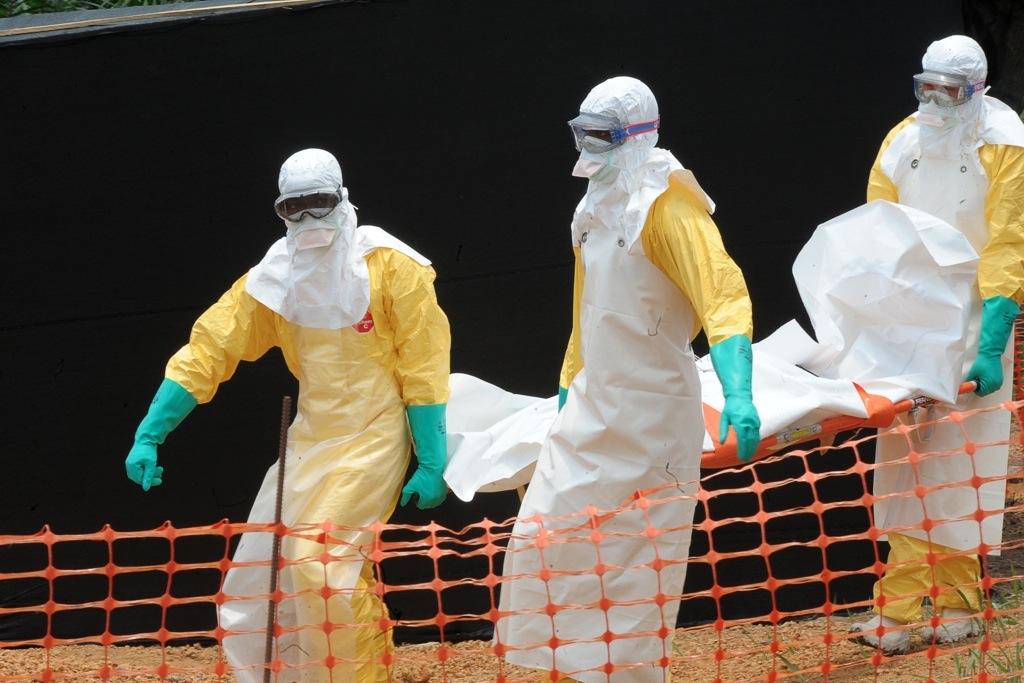Q&A: What’s being done about the deadly Ebola outbreak in West Africa?
Workers with Doctors without Borders carry the body of a person killed by the Ebola virus.
On Friday, the World Health Organization launched a $100-million campaign to combat the unprecedented Ebola outbreak in West Africa. More than 700 people have died and 1,300 have been infected by the hemorrhagic virus, leaving health workers on the ground in Liberia, Guinea and Sierra Leone — the three countries most affected — completely overwhelmed.
Dr. Margaret Chan, director-general of the WHO, has warned the international community that the disease “is moving faster than our efforts to control it.” It has claimed the lives of 60 aid workers and infected several more, depleting the ranks of people on the front lines of fighting the outbreak.
The WHO, which is relying on its member organizations to help fund the $100 million, will use the money to add more personnel on the ground, map the outbreak and set up better isolation facilities. (Some of those currently operating don’t have access to electricity or a safe water supply.) GlobalPost spoke with Paul Garwood, a spokesman for the organization, to get more details on the plan.
GlobalPost: How will this new campaign stop Ebola?
Paul Garwood: It's key to get more health staff on the ground. That's critical. [We need people] across all the major areas such as clinical doctors, nurses, epidemiologists, [and] experts in social mobilization and communications. Having the right staff in place will enable health care providers to undertake the kind of services that are needed for protection control, contact tracing, and [to] contact the people who have been infected with the virus so we can really go back to the source of the virus within these communities. That way we can identify people who have potentially come in contact with the disease — even if people are asymptomatic — to offer them treatment and to do everything possible to isolate them.
Why has it been so difficult to contain?
There are lots of factors at play. The porous nature of the borders in between these three countries enables people to cross very easily so that has made it more difficult to protect people. … The fragility of the health systems in these regions is another factor when it comes to treatment or contact tracing. The fact [is] that many people who have come in contact with the virus have not come to health facilities so it's been hard to trace … [and] difficult to break transmission chains.
What prompted the establishment of the campaign now?
There is a real need to bring the outbreak under control. For quite some time, the World Health Organization and other health partners on the ground have been seeking extra personnel. It's not the first time we've put out a call for more staff and trained experts to be a part of the response. But what this really does is bring all the main parties together under one plan.
It sounds like a large part of this effort is education so that people can recognize the symptoms and know what to do if they are infected.
Education is key, especially informing people that there are measures that can be taken to respond to and control this outbreak — increasing awareness particularly in the hard to reach communities where maybe they don't have accurate information about the outbreak and about the virus and how it can be dealt with.
How do you reach those remote areas?
[The message] has to be tailored to the different regions. You go out and talk to community leaders and tribal leaders who have influence with their people. You have to make sure that the right information exists in the health facilities so healthcare workers who are coming into contact with people don't contract the virus and can identify people who have.
Given that this is the deadliest Ebola outbreak ever, are there certain factors at play that have exascerbated the situation?
[People within] these communities, many of which have been cautious about their response and have been cautious about going to health facilities, [aren't] receiving the health care they need and in many cases they are remaining in their communities. This had enabled the transmission to continue undetected. … The scale of outbreak has posed major challenges to the health facilities in this region. Many of the hospitals and clinics are quite fragile due to the development status of the countries themselves so there has been a range of factors that have come together to make this a very challenging situation.
What can medical staff do to help Ebola patients?
There is no vaccine, no medicine available for Ebola so the best course of case management is through early presentation to a health facility to receive care. [And that] is hydration and making sure your body is filled with electrolytes. That will give your body — your immune system — the best chance to cope with fighting the virus. So, the earlier the better.
How is Ebola transmitted?
It's really really important for people to know that this is not an airborne virus. It's not something that's passed around like the flu or a cold or something like that. It's [transmitted] through person-to-person contact. … It's relatively easy to avoid contact with infected people.
There was a case of one patient who flew from Liberia to Nigeria and brought Ebola with him. How worried should people be about the disease spreading further?
That case [involved] someone taking a plane and arriving in the country with the symptoms. He was isolated in Lagos, and received care but sadly passed away. That was the one reported case. All the other cases have been concentrated in those three countries.
